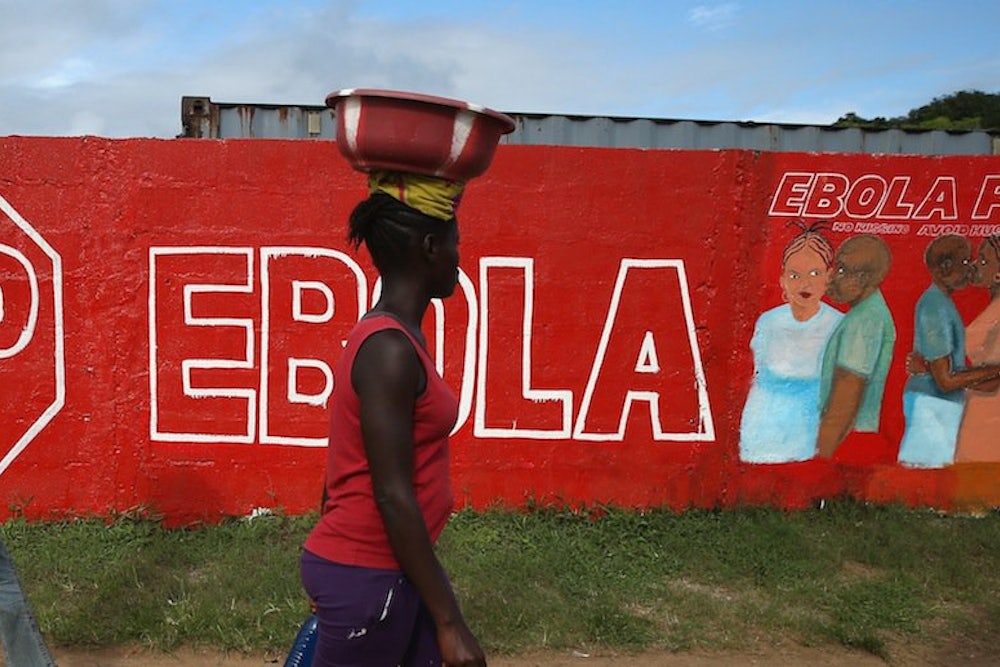With over 8,200 West Africans dead from Ebola and over 21,000 cases worldwide since the outbreak started a year ago, Johnson & Johnson started trials of its Ebola vaccine on Tuesday. The pharmaceutical company is lagging behind its competitors: Merck resumed clinical trials for its Ebola vaccine on Monday after a three-week pause, while GlaxoSmithKline has already published results of its experimental vaccine’s first trial phase. The companies and other individual and government investors have poured over $300 million into the race for a vaccine, and the high-stakes competition has elicited ample media coverage. But all of the buzz around—and the money being invested in—finding an Ebola vaccine is distracting us from an urgently needed medical innovation that’s proven highly effective against a range of diseases, and is much easier to achieve: basic, around-the-clock nursing care.
It’s natural to get caught up in a race for a magic bullet: Vaccines have eradicated some of the nastiest diseases in human history, and the race for an Ebola vaccine has the hallmarks of most dramatic vaccine races in history, from to anthrax to polio. According to Dr. David Barnes, a professor of the history of medicine at University of Pennsylvania, our enthusiasm for vaccine development drama can be traced back to two events in the late-nineteenth century: Louis Pasteur’s dramatic, public anthrax vaccine trial using farm animals in 1881, and Robert Koch’s 1882 discovery of the tubercle bacillus, the bacteria responsible for tuberculosis, which is estimated to have been responsible for one in seven deaths at the time. (Pasteur and Koch had an intense public rivalry at the time.) These events played a significant role in the bacteriological revolution and our subsequent obsessions with vaccination, with waging war on germs, and with battling illness. Our attitudes haven’t changed much since: In October, The New Yorker published an epic account of the race to find an Ebola cure called "The Ebola Wars."
But the thing is, we already know how to prevent Ebola—by following basic protective protocol like isolating Ebola patients immediately, and having healthcare workers wear personal protective equipment. We’ve also had success in curing infected patients without miracle drugs. In October, infectious disease specialist Paul Farmer wrote in The London Review of Books that with “aggressive supportive care,” 90 percent of Ebola patients should survive. Of the Ebola cases diagnosed in the United States in 2014, all but one survived—and Thomas Duncan's death was likely because he was misdiagnosed and went days without treatment. The New York Times keeps a running count of how many Ebola patients have been treated outside of Africa, and the vast majority of patients brought to countries with robust healthcare infrastructures have survived.
"[Basic nursing care] is not sexy, it’s not going to get you headlines, it’s not going to get you profits, it’s not going to get you good p.r.," Dr. Barnes warned. "But it’s absolutely the one lesson of Ebola. It’s the one thing that urgently needed to be done before Ebola hit Guinea, Sierra Leone, and Liberia, and will be urgently needed after Ebola leaves those countries."
Indeed, we’re only beginning to grasp how Ebola has devastated healthcare systems that were already fragile to begin with. The Associated Press issued a story in November quoting experts from the World Health Organization who say the Ebola outbreak “has spawned a ‘silent killer.” From the story:
None of roughly a dozen experts interviewed by The Associated Press could say how many people might be sick or dying for lack of health care. Tracking the diseases that usually plague Guinea, Liberia and Sierra Leone—malaria, pneumonia, cholera and diarrhea diseases—is difficult even in the best of times. Now the countries’ already weak health systems are broken down amid the Ebola epidemic.
As international organizations like GAVI, the global vaccines alliance, pledge hundreds of millions of dollars to spend on vaccine courses that are not yet available, we should applaud these contributions to the race to eradicate Ebola. But let’s not forget that there will always be another virus, another outbreak, another public health emergency. We shouldn’t have to choose between eradicating a deadly disease and supporting efforts to establish stronger healthcare systems in countries that are most vulnerable to large-scale public health crises, but funds and attention are not limitless. With so much focus on the vaccine race in the last few months, we shouldn’t let ourselves be distracted from the desperate need for adequate nursing care in so many parts of the world. Finding a solution for that won’t be as exciting or as immediately gratifying as developing a new vaccine, but it would be the ultimate preventative measure in stopping future epidemics before they start.
